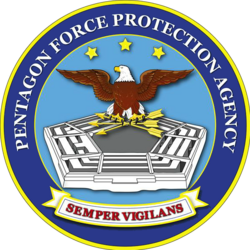Pentagon Force Protection Agency Criminal Investigations & Office of Professional Responsibility Directorate
The mission of the PFPA Criminal Investigation and Office of Professional Responsibility is to investigate criminal acts occurring within the Pentagon and certain other designated DoD buildings, both U.S. Government owned and leased located within the National Capital Region (NCR). The CI/OPR is the investigative arm of the PFPA and as such, is responsible to respond to and investigate mainly felony offenses committed in the mentioned area of responsibility.
PFPA CI/OPR has three distinct investigative missions:
- Criminal Investigations
- Internal Investigations, and
- Special Crimes Unit
PFPA CI/OPR personnel are series 1811 (Criminal Investigators). They are trained in the full spectrum of criminal investigation matters, including forensic topics such as crime scene processing, interview/interrogation, crime scene photography, and surveillance, among others. The Investigators routinely receive specialized and the most up-to-date forensic and interview/interrogation training, usually conducted at the Federal Law Enforcement Training Centers (FLETC) and from military, state, and local courses.
PFPA Criminal Investigators are responsible for investigating violations of Title 18 United States Code, Title 21 United States Code as it pertains to Drug Enforcement, Code of Federal Regulations 32, Section 40b as it pertains to conduct on the Pentagon reservation, and Code of Federal Regulations 41 as it pertains to conduct in locations under the purview of the Department of Defense. Investigators are also required to have a working knowledge of the Criminal Code of the Commonwealth of Virginia, the Criminal Code of the State of Maryland, and the Criminal Code of the District of Columbia since their investigations may require Investigators to obtain arrest and/or search and seizure warrants in those jurisdictions. Likewise a close working relationship with the U.S. Attorney's office and/or state and local prosecutors is required in order to prepare investigative reports, testify before grand juries, in Federal, military, state or local court in order to achieve a successful prosecution.
PFPA CI/OPR routinely works closely with federal, military, state and local law enforcement agencies including the Federal Bureau of Investigation, the United States Secret Service, and the individual service investigative activities. The Internal Affairs section investigates allegations within PFPA of criminal and administrative nature involving PFPA members. [4]
Special Operations Division K-9 Unit
The K-9 Unit is the explosive detection unit for the Department of Defense community in and around the Washington D.C. area. The K-9 Unit is organized into several teams (canine and handler) that provide both proactive and reactive law enforcement functions in order to ensure a safe working environment at the Pentagon Reservation and its other associated properties.
The Officers of the PPD Special Operations K-9 Unit are dedicated to duty and ready to respond to any situation at a moment's notice. The dogs live with their assigned PPD Officers and are a part of most aspects of the Officer's home life. This relationship is necessary to provide the most effective dog/handler rapport. Since the handler and canines are always together, it provides for an efficient response time to incidents when canine support is needed. [5]
Pentagon Force Protection Agency Protective Services Division
Dignitary protection is not unique in today's federal police agencies. Across the country, police departments often provide dignitary protection for their leaders and other high ranking or influential people. The Pentagon Force Protection Agency (PFPA) is no different. The mission of the PSU is to protect principals from harm or embarrassment and to expedite their movements when necessary. In achieving their goals, PSU personnel must be highly trained and experts in numerous law enforcement skills in order to provide a premier security posture for, and according to specification of the individual principal's needs. An additional function of the PSU is to support the coordination of special events that take place in, and around the Pentagon Reservation. The PSU serves as the single point of contact for PPD on all ceremonies in honor of visiting dignitaries hosted by the Office of Secretary of Defense and the Chairman of the Joint Chiefs of Staff. Various protocol offices such as the Joint Chiefs of Staff, Office of the Secretary of Defense and the Office of Defense Foreign Affairs utilize PSU officers to assist their organization and ensure their events operate as smoothly as possible.
Quality public relations skills are critical for the PSU. For PSU personnel, strong diplomatic skills and the ability to effectively operate in high-pressure situations are extremely important. [6]




